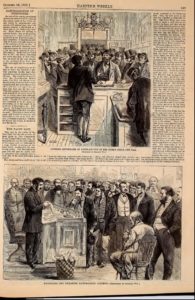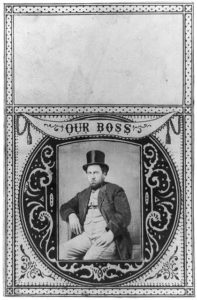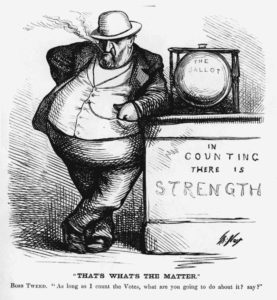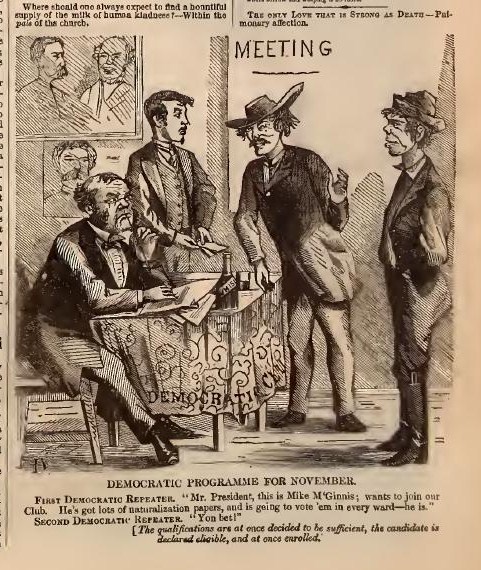150 years ago this month three New York City newspapers published reports of alleged voter fraud. It seems that the October 10, 1868 issue of Harper’s Weekly is saying that the legal process of naturalization was being corrupted by men already citizens who applied for naturalization by providing false addresses.
The October 25, 1868 issue of The New-York Times reported on the first day of proceedings in a United States Circuit Court in the matter of Benjamin B. Rosenberg, who was charged with fraudulently supplying naturalization certificates for a fee. Apparently federal Marshal Murray conducted a sting operation. Witnesses testified that the defendant charged two dollars per certificate; Mr. Rosenberg told a witness he didn’t make any profit on the transactions because he had to divide the $2 “equally between the sham principal and his bogus witness;” testimony indicated that Mr. Rosenberg offered volume discounts – only $1.50 per certificate for orders greater than one hundred; witnesses suggested the the defendant would only supply the papers to Democrat operatives.
In an article about stealing elections City Journal said that an 1868 issue of The Nation “reported that Tammany Hall had set up a “naturalization mill,” instantly certifying folks right off the boat as citizens—and Tammany voters.” Tammany Hall was the Democratic political machine in New York City. The City Journal article goes on to say that
in 1877 testimony Tammany’s Boss Tweed was asked if the 1868 election was fair. He said that he couldn’t remember the particulars but that “I don’t think there was ever a fair or honest election in the City of New York.”
HathiTrust provides the 1868 issues of The Nation. When I searched for “naturalization mill” I didn’t see anything (so far) about Democrats actually waiting right on the docks to provide an expressway to citizenship for new immigrants, but many didn’t have to wait five years to be naturalized. From page 341 in the October 29, 1868 issue:
The naturalization mill has finished its work for this election, having ground out 35,000 voters in this city alone. Of these, 10,000 are perhaps rightly admitted, 10,000 have passed through the machine without having been here five years, and the other 15,000 have never, at any rate, been near the court-room; indeed, from 5,000 to 7,000 of these latter are non-existent.
From page 361 in the November 5, 1868 issue (right after the November 3rd election):
No election in the country was ever attended by so much fraud as the one we have just gone through. In this State, of course, the natural home of chicane and boundless rascality, the fattening-place of the corruptest of all American politicians, every variety of cheating has been practised. The naturalization mill we spoke of last week is probably the most effective of all the means of defrauding honest citizens of the control of their political affairs. Men in thousands were made citizens who have no more right to a certificate and a vote than if they were still on their native side of the Atlantic. False names in thousands were put on the registration lists, and on the strength of them repeaters went from precinct to precinct voting early and often. In Brooklyn, in open defiance of law, the officials whose duty it was to count the vote deliberately announced their intention of performing their functions in secret with closed doors. This in order to make the majority as large as might be needed. Such a proceeding, of course, makes the perpetrators of it liable to punishment on conviction, but unfortunately it does not vitiate the poll— and conviction these gentry do not greatly fear. In order that it might be learned just how large a majority it was that would probably be needed, the notorious Supervisor Tweed and his associates sent out a day or two before the election to every county in the State a circular to this effect: The recipient was to make arrangements with a shrewd and reliable Democrat in each city and in most of the towns, whose business it should be to transmit in the early part of the evening an approximate estimate of the relative vote of the two parties. “There was, of course an important object to be gained.” The object was, of course, that the Hoffman ring might in turn tell their henchmen in this county and Kings how many ballots to add to the number really cast, fraudulently or honestly. …




